HC2121 Comparative Business Ethics and Social Responsibility Report
VerifiedAdded on 2022/11/29
|8
|2145
|254
Report
AI Summary
This report analyzes the ethical issues arising from the Uber Australia case, where the company was accused of using spyware to target competitors like GoCatch. The report delves into the ethical implications of such actions, moving beyond personal ethics to examine legal ramifications and decision-making processes. It explores the importance of business ethics and social responsibility, highlighting how organizations must balance economic growth with societal well-being and environmental considerations. The report discusses relevant ethical moral philosophies, such as utilitarianism, to guide ethical decision-making, emphasizing the consequences of actions. It also touches on the importance of individual ethical judgements and how they contribute to creating trust, honesty, and long-term gains. The report concludes by recommending that organizations consider ethical issues in their workplaces, using the Uber Australia case as a relevant example for applying business ethics theories.
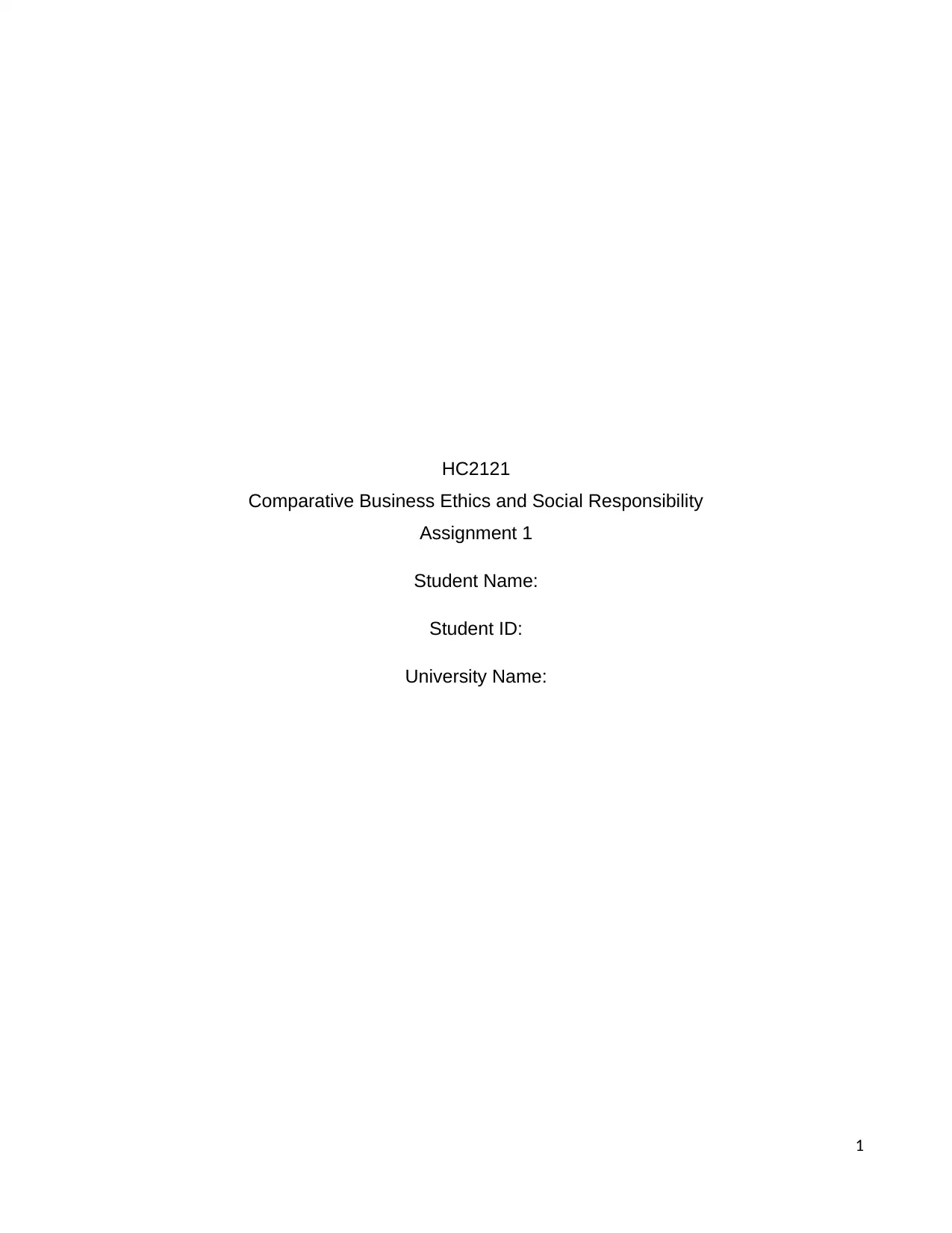
HC2121
Comparative Business Ethics and Social Responsibility
Assignment 1
Student Name:
Student ID:
University Name:
1
Comparative Business Ethics and Social Responsibility
Assignment 1
Student Name:
Student ID:
University Name:
1
Paraphrase This Document
Need a fresh take? Get an instant paraphrase of this document with our AI Paraphraser
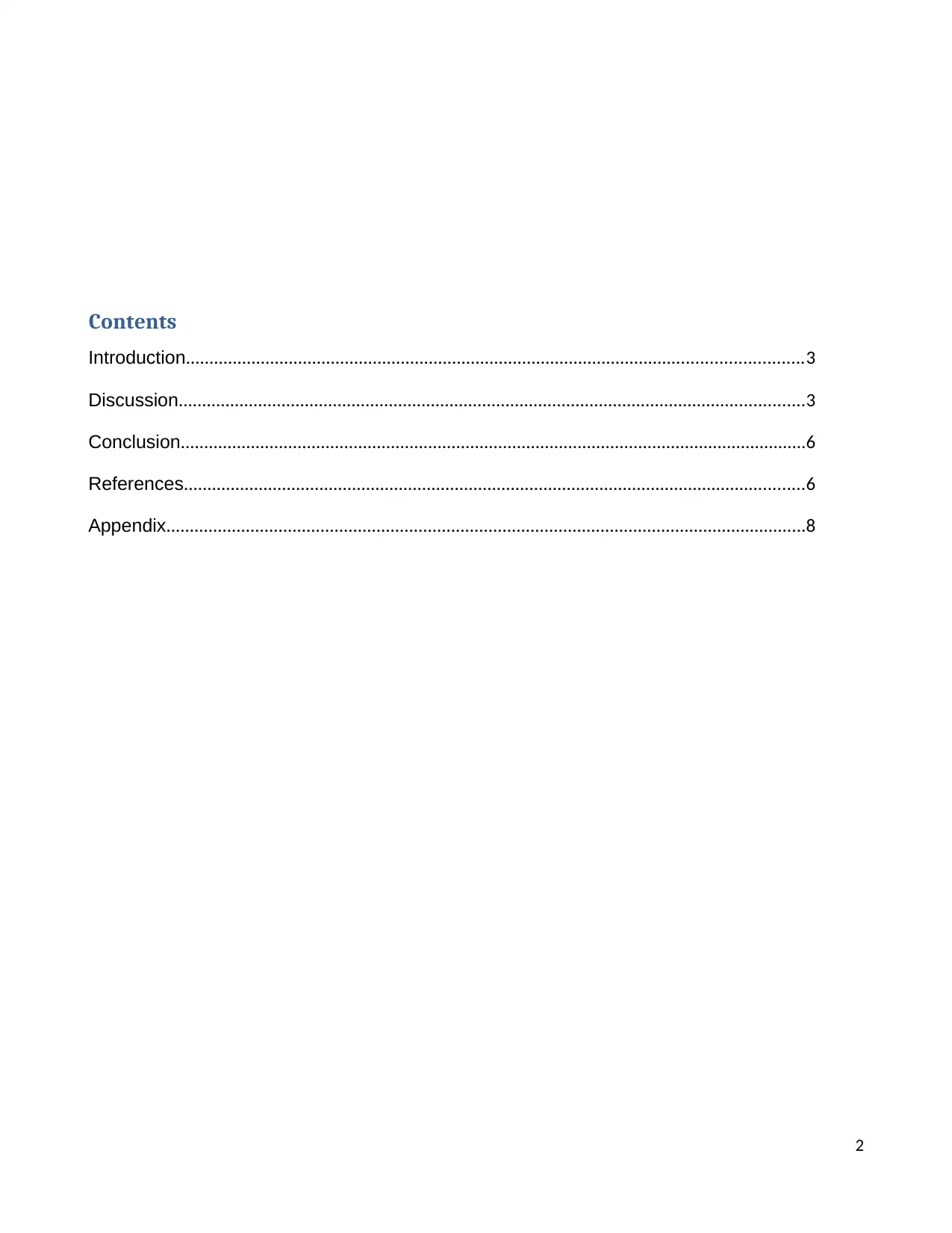
Contents
Introduction....................................................................................................................................3
Discussion......................................................................................................................................3
Conclusion......................................................................................................................................6
References.....................................................................................................................................6
Appendix.........................................................................................................................................8
2
Introduction....................................................................................................................................3
Discussion......................................................................................................................................3
Conclusion......................................................................................................................................6
References.....................................................................................................................................6
Appendix.........................................................................................................................................8
2
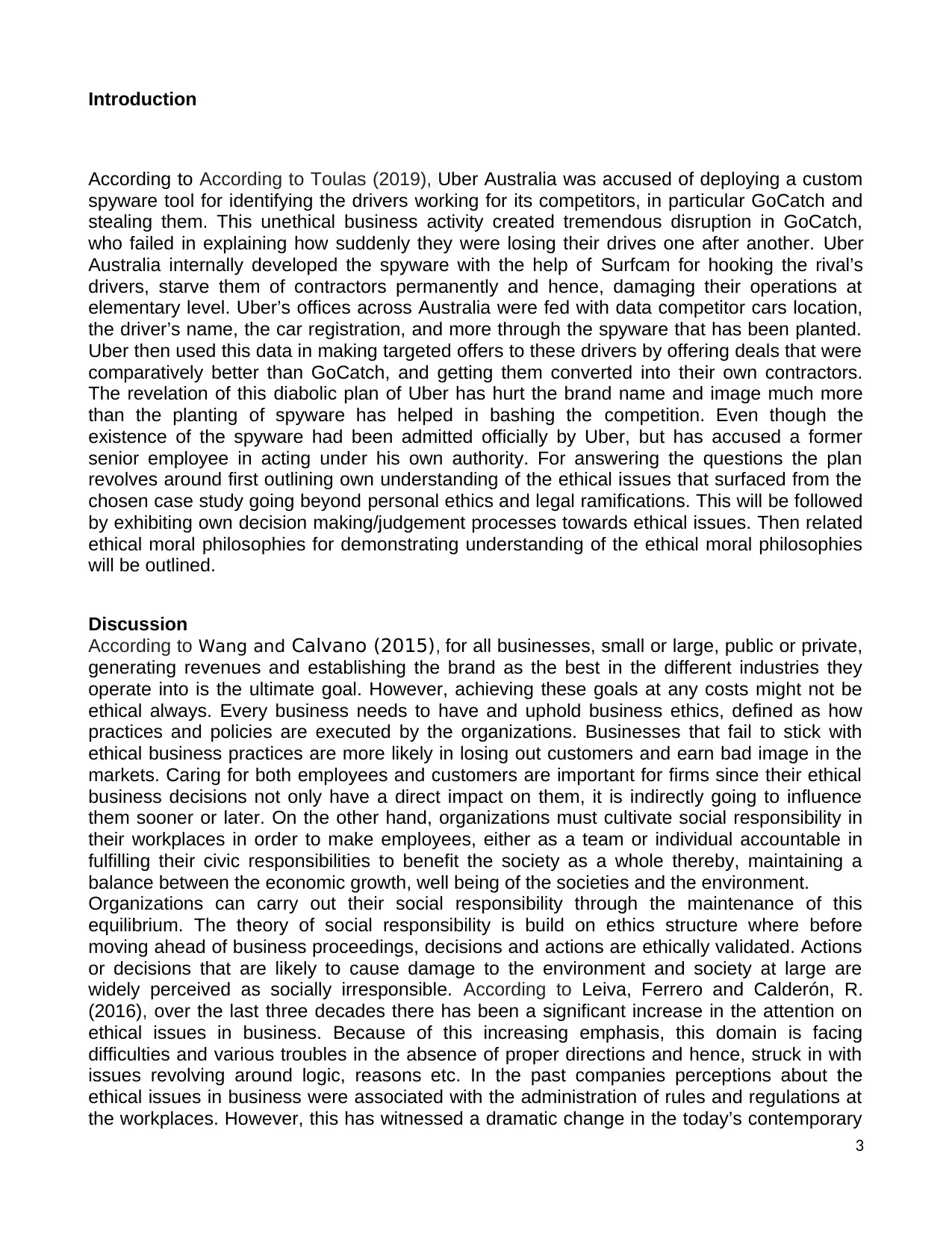
Introduction
According to According to Toulas (2019), Uber Australia was accused of deploying a custom
spyware tool for identifying the drivers working for its competitors, in particular GoCatch and
stealing them. This unethical business activity created tremendous disruption in GoCatch,
who failed in explaining how suddenly they were losing their drives one after another. Uber
Australia internally developed the spyware with the help of Surfcam for hooking the rival’s
drivers, starve them of contractors permanently and hence, damaging their operations at
elementary level. Uber’s offices across Australia were fed with data competitor cars location,
the driver’s name, the car registration, and more through the spyware that has been planted.
Uber then used this data in making targeted offers to these drivers by offering deals that were
comparatively better than GoCatch, and getting them converted into their own contractors.
The revelation of this diabolic plan of Uber has hurt the brand name and image much more
than the planting of spyware has helped in bashing the competition. Even though the
existence of the spyware had been admitted officially by Uber, but has accused a former
senior employee in acting under his own authority. For answering the questions the plan
revolves around first outlining own understanding of the ethical issues that surfaced from the
chosen case study going beyond personal ethics and legal ramifications. This will be followed
by exhibiting own decision making/judgement processes towards ethical issues. Then related
ethical moral philosophies for demonstrating understanding of the ethical moral philosophies
will be outlined.
Discussion
According to Wang and Calvano (2015), for all businesses, small or large, public or private,
generating revenues and establishing the brand as the best in the different industries they
operate into is the ultimate goal. However, achieving these goals at any costs might not be
ethical always. Every business needs to have and uphold business ethics, defined as how
practices and policies are executed by the organizations. Businesses that fail to stick with
ethical business practices are more likely in losing out customers and earn bad image in the
markets. Caring for both employees and customers are important for firms since their ethical
business decisions not only have a direct impact on them, it is indirectly going to influence
them sooner or later. On the other hand, organizations must cultivate social responsibility in
their workplaces in order to make employees, either as a team or individual accountable in
fulfilling their civic responsibilities to benefit the society as a whole thereby, maintaining a
balance between the economic growth, well being of the societies and the environment.
Organizations can carry out their social responsibility through the maintenance of this
equilibrium. The theory of social responsibility is build on ethics structure where before
moving ahead of business proceedings, decisions and actions are ethically validated. Actions
or decisions that are likely to cause damage to the environment and society at large are
widely perceived as socially irresponsible. According to Leiva, Ferrero and Calderón, R.
(2016), over the last three decades there has been a significant increase in the attention on
ethical issues in business. Because of this increasing emphasis, this domain is facing
difficulties and various troubles in the absence of proper directions and hence, struck in with
issues revolving around logic, reasons etc. In the past companies perceptions about the
ethical issues in business were associated with the administration of rules and regulations at
the workplaces. However, this has witnessed a dramatic change in the today’s contemporary
3
According to According to Toulas (2019), Uber Australia was accused of deploying a custom
spyware tool for identifying the drivers working for its competitors, in particular GoCatch and
stealing them. This unethical business activity created tremendous disruption in GoCatch,
who failed in explaining how suddenly they were losing their drives one after another. Uber
Australia internally developed the spyware with the help of Surfcam for hooking the rival’s
drivers, starve them of contractors permanently and hence, damaging their operations at
elementary level. Uber’s offices across Australia were fed with data competitor cars location,
the driver’s name, the car registration, and more through the spyware that has been planted.
Uber then used this data in making targeted offers to these drivers by offering deals that were
comparatively better than GoCatch, and getting them converted into their own contractors.
The revelation of this diabolic plan of Uber has hurt the brand name and image much more
than the planting of spyware has helped in bashing the competition. Even though the
existence of the spyware had been admitted officially by Uber, but has accused a former
senior employee in acting under his own authority. For answering the questions the plan
revolves around first outlining own understanding of the ethical issues that surfaced from the
chosen case study going beyond personal ethics and legal ramifications. This will be followed
by exhibiting own decision making/judgement processes towards ethical issues. Then related
ethical moral philosophies for demonstrating understanding of the ethical moral philosophies
will be outlined.
Discussion
According to Wang and Calvano (2015), for all businesses, small or large, public or private,
generating revenues and establishing the brand as the best in the different industries they
operate into is the ultimate goal. However, achieving these goals at any costs might not be
ethical always. Every business needs to have and uphold business ethics, defined as how
practices and policies are executed by the organizations. Businesses that fail to stick with
ethical business practices are more likely in losing out customers and earn bad image in the
markets. Caring for both employees and customers are important for firms since their ethical
business decisions not only have a direct impact on them, it is indirectly going to influence
them sooner or later. On the other hand, organizations must cultivate social responsibility in
their workplaces in order to make employees, either as a team or individual accountable in
fulfilling their civic responsibilities to benefit the society as a whole thereby, maintaining a
balance between the economic growth, well being of the societies and the environment.
Organizations can carry out their social responsibility through the maintenance of this
equilibrium. The theory of social responsibility is build on ethics structure where before
moving ahead of business proceedings, decisions and actions are ethically validated. Actions
or decisions that are likely to cause damage to the environment and society at large are
widely perceived as socially irresponsible. According to Leiva, Ferrero and Calderón, R.
(2016), over the last three decades there has been a significant increase in the attention on
ethical issues in business. Because of this increasing emphasis, this domain is facing
difficulties and various troubles in the absence of proper directions and hence, struck in with
issues revolving around logic, reasons etc. In the past companies perceptions about the
ethical issues in business were associated with the administration of rules and regulations at
the workplaces. However, this has witnessed a dramatic change in the today’s contemporary
3
⊘ This is a preview!⊘
Do you want full access?
Subscribe today to unlock all pages.

Trusted by 1+ million students worldwide
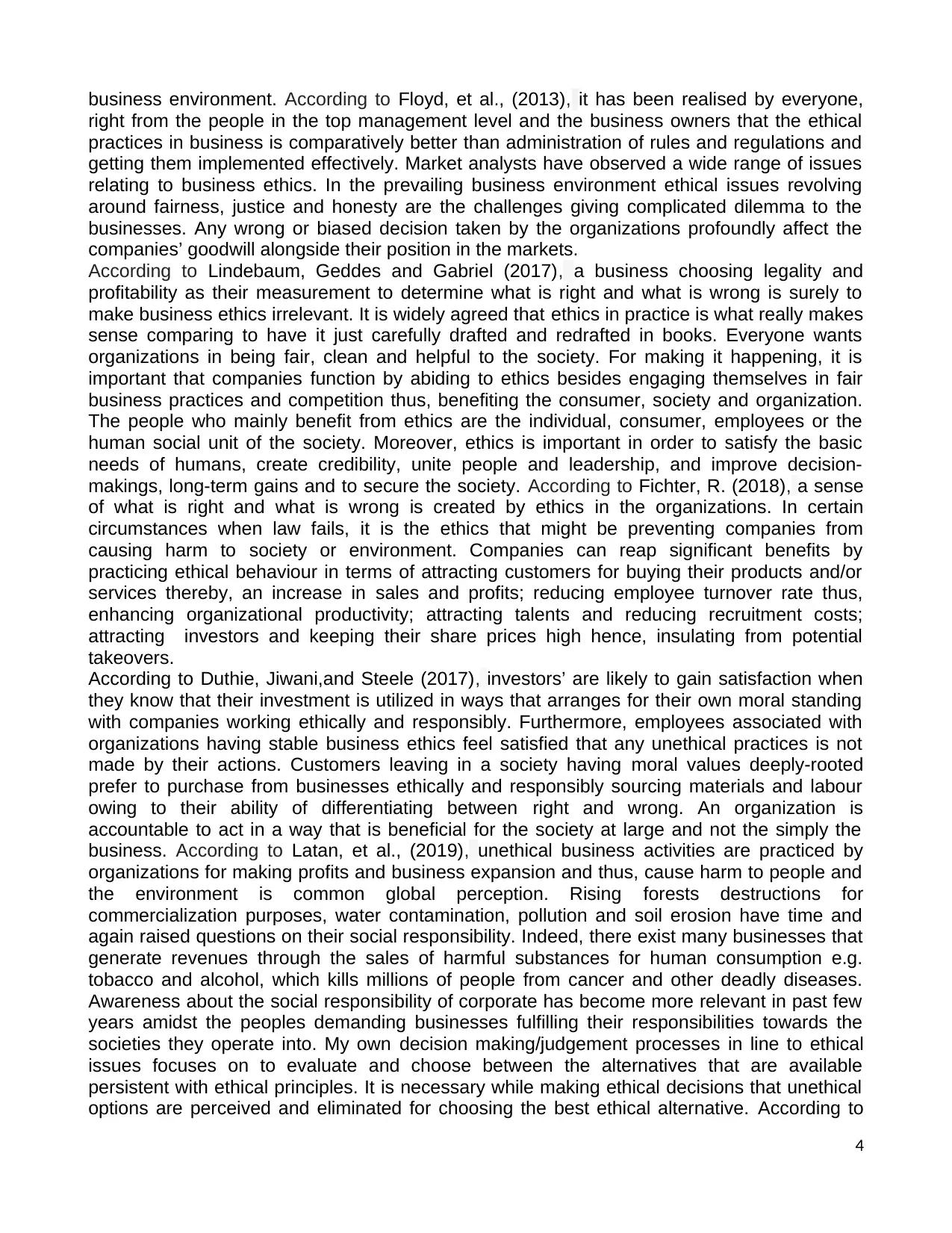
business environment. According to Floyd, et al., (2013), it has been realised by everyone,
right from the people in the top management level and the business owners that the ethical
practices in business is comparatively better than administration of rules and regulations and
getting them implemented effectively. Market analysts have observed a wide range of issues
relating to business ethics. In the prevailing business environment ethical issues revolving
around fairness, justice and honesty are the challenges giving complicated dilemma to the
businesses. Any wrong or biased decision taken by the organizations profoundly affect the
companies’ goodwill alongside their position in the markets.
According to Lindebaum, Geddes and Gabriel (2017), a business choosing legality and
profitability as their measurement to determine what is right and what is wrong is surely to
make business ethics irrelevant. It is widely agreed that ethics in practice is what really makes
sense comparing to have it just carefully drafted and redrafted in books. Everyone wants
organizations in being fair, clean and helpful to the society. For making it happening, it is
important that companies function by abiding to ethics besides engaging themselves in fair
business practices and competition thus, benefiting the consumer, society and organization.
The people who mainly benefit from ethics are the individual, consumer, employees or the
human social unit of the society. Moreover, ethics is important in order to satisfy the basic
needs of humans, create credibility, unite people and leadership, and improve decision-
makings, long-term gains and to secure the society. According to Fichter, R. (2018), a sense
of what is right and what is wrong is created by ethics in the organizations. In certain
circumstances when law fails, it is the ethics that might be preventing companies from
causing harm to society or environment. Companies can reap significant benefits by
practicing ethical behaviour in terms of attracting customers for buying their products and/or
services thereby, an increase in sales and profits; reducing employee turnover rate thus,
enhancing organizational productivity; attracting talents and reducing recruitment costs;
attracting investors and keeping their share prices high hence, insulating from potential
takeovers.
According to Duthie, Jiwani,and Steele (2017), investors’ are likely to gain satisfaction when
they know that their investment is utilized in ways that arranges for their own moral standing
with companies working ethically and responsibly. Furthermore, employees associated with
organizations having stable business ethics feel satisfied that any unethical practices is not
made by their actions. Customers leaving in a society having moral values deeply-rooted
prefer to purchase from businesses ethically and responsibly sourcing materials and labour
owing to their ability of differentiating between right and wrong. An organization is
accountable to act in a way that is beneficial for the society at large and not the simply the
business. According to Latan, et al., (2019), unethical business activities are practiced by
organizations for making profits and business expansion and thus, cause harm to people and
the environment is common global perception. Rising forests destructions for
commercialization purposes, water contamination, pollution and soil erosion have time and
again raised questions on their social responsibility. Indeed, there exist many businesses that
generate revenues through the sales of harmful substances for human consumption e.g.
tobacco and alcohol, which kills millions of people from cancer and other deadly diseases.
Awareness about the social responsibility of corporate has become more relevant in past few
years amidst the peoples demanding businesses fulfilling their responsibilities towards the
societies they operate into. My own decision making/judgement processes in line to ethical
issues focuses on to evaluate and choose between the alternatives that are available
persistent with ethical principles. It is necessary while making ethical decisions that unethical
options are perceived and eliminated for choosing the best ethical alternative. According to
4
right from the people in the top management level and the business owners that the ethical
practices in business is comparatively better than administration of rules and regulations and
getting them implemented effectively. Market analysts have observed a wide range of issues
relating to business ethics. In the prevailing business environment ethical issues revolving
around fairness, justice and honesty are the challenges giving complicated dilemma to the
businesses. Any wrong or biased decision taken by the organizations profoundly affect the
companies’ goodwill alongside their position in the markets.
According to Lindebaum, Geddes and Gabriel (2017), a business choosing legality and
profitability as their measurement to determine what is right and what is wrong is surely to
make business ethics irrelevant. It is widely agreed that ethics in practice is what really makes
sense comparing to have it just carefully drafted and redrafted in books. Everyone wants
organizations in being fair, clean and helpful to the society. For making it happening, it is
important that companies function by abiding to ethics besides engaging themselves in fair
business practices and competition thus, benefiting the consumer, society and organization.
The people who mainly benefit from ethics are the individual, consumer, employees or the
human social unit of the society. Moreover, ethics is important in order to satisfy the basic
needs of humans, create credibility, unite people and leadership, and improve decision-
makings, long-term gains and to secure the society. According to Fichter, R. (2018), a sense
of what is right and what is wrong is created by ethics in the organizations. In certain
circumstances when law fails, it is the ethics that might be preventing companies from
causing harm to society or environment. Companies can reap significant benefits by
practicing ethical behaviour in terms of attracting customers for buying their products and/or
services thereby, an increase in sales and profits; reducing employee turnover rate thus,
enhancing organizational productivity; attracting talents and reducing recruitment costs;
attracting investors and keeping their share prices high hence, insulating from potential
takeovers.
According to Duthie, Jiwani,and Steele (2017), investors’ are likely to gain satisfaction when
they know that their investment is utilized in ways that arranges for their own moral standing
with companies working ethically and responsibly. Furthermore, employees associated with
organizations having stable business ethics feel satisfied that any unethical practices is not
made by their actions. Customers leaving in a society having moral values deeply-rooted
prefer to purchase from businesses ethically and responsibly sourcing materials and labour
owing to their ability of differentiating between right and wrong. An organization is
accountable to act in a way that is beneficial for the society at large and not the simply the
business. According to Latan, et al., (2019), unethical business activities are practiced by
organizations for making profits and business expansion and thus, cause harm to people and
the environment is common global perception. Rising forests destructions for
commercialization purposes, water contamination, pollution and soil erosion have time and
again raised questions on their social responsibility. Indeed, there exist many businesses that
generate revenues through the sales of harmful substances for human consumption e.g.
tobacco and alcohol, which kills millions of people from cancer and other deadly diseases.
Awareness about the social responsibility of corporate has become more relevant in past few
years amidst the peoples demanding businesses fulfilling their responsibilities towards the
societies they operate into. My own decision making/judgement processes in line to ethical
issues focuses on to evaluate and choose between the alternatives that are available
persistent with ethical principles. It is necessary while making ethical decisions that unethical
options are perceived and eliminated for choosing the best ethical alternative. According to
4
Paraphrase This Document
Need a fresh take? Get an instant paraphrase of this document with our AI Paraphraser
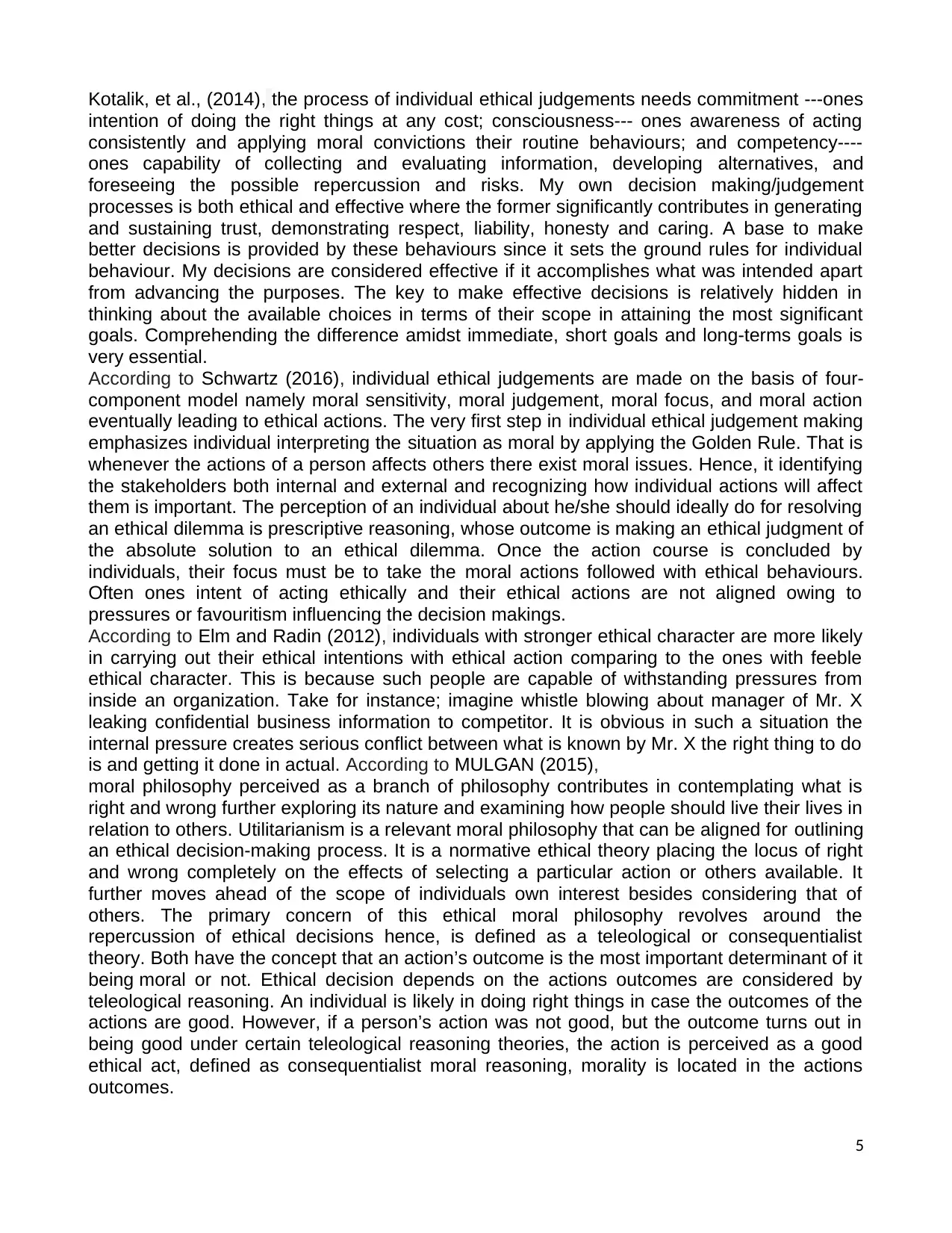
Kotalik, et al., (2014), the process of individual ethical judgements needs commitment ---ones
intention of doing the right things at any cost; consciousness--- ones awareness of acting
consistently and applying moral convictions their routine behaviours; and competency----
ones capability of collecting and evaluating information, developing alternatives, and
foreseeing the possible repercussion and risks. My own decision making/judgement
processes is both ethical and effective where the former significantly contributes in generating
and sustaining trust, demonstrating respect, liability, honesty and caring. A base to make
better decisions is provided by these behaviours since it sets the ground rules for individual
behaviour. My decisions are considered effective if it accomplishes what was intended apart
from advancing the purposes. The key to make effective decisions is relatively hidden in
thinking about the available choices in terms of their scope in attaining the most significant
goals. Comprehending the difference amidst immediate, short goals and long-terms goals is
very essential.
According to Schwartz (2016), individual ethical judgements are made on the basis of four-
component model namely moral sensitivity, moral judgement, moral focus, and moral action
eventually leading to ethical actions. The very first step in individual ethical judgement making
emphasizes individual interpreting the situation as moral by applying the Golden Rule. That is
whenever the actions of a person affects others there exist moral issues. Hence, it identifying
the stakeholders both internal and external and recognizing how individual actions will affect
them is important. The perception of an individual about he/she should ideally do for resolving
an ethical dilemma is prescriptive reasoning, whose outcome is making an ethical judgment of
the absolute solution to an ethical dilemma. Once the action course is concluded by
individuals, their focus must be to take the moral actions followed with ethical behaviours.
Often ones intent of acting ethically and their ethical actions are not aligned owing to
pressures or favouritism influencing the decision makings.
According to Elm and Radin (2012), individuals with stronger ethical character are more likely
in carrying out their ethical intentions with ethical action comparing to the ones with feeble
ethical character. This is because such people are capable of withstanding pressures from
inside an organization. Take for instance; imagine whistle blowing about manager of Mr. X
leaking confidential business information to competitor. It is obvious in such a situation the
internal pressure creates serious conflict between what is known by Mr. X the right thing to do
is and getting it done in actual. According to MULGAN (2015),
moral philosophy perceived as a branch of philosophy contributes in contemplating what is
right and wrong further exploring its nature and examining how people should live their lives in
relation to others. Utilitarianism is a relevant moral philosophy that can be aligned for outlining
an ethical decision-making process. It is a normative ethical theory placing the locus of right
and wrong completely on the effects of selecting a particular action or others available. It
further moves ahead of the scope of individuals own interest besides considering that of
others. The primary concern of this ethical moral philosophy revolves around the
repercussion of ethical decisions hence, is defined as a teleological or consequentialist
theory. Both have the concept that an action’s outcome is the most important determinant of it
being moral or not. Ethical decision depends on the actions outcomes are considered by
teleological reasoning. An individual is likely in doing right things in case the outcomes of the
actions are good. However, if a person’s action was not good, but the outcome turns out in
being good under certain teleological reasoning theories, the action is perceived as a good
ethical act, defined as consequentialist moral reasoning, morality is located in the actions
outcomes.
5
intention of doing the right things at any cost; consciousness--- ones awareness of acting
consistently and applying moral convictions their routine behaviours; and competency----
ones capability of collecting and evaluating information, developing alternatives, and
foreseeing the possible repercussion and risks. My own decision making/judgement
processes is both ethical and effective where the former significantly contributes in generating
and sustaining trust, demonstrating respect, liability, honesty and caring. A base to make
better decisions is provided by these behaviours since it sets the ground rules for individual
behaviour. My decisions are considered effective if it accomplishes what was intended apart
from advancing the purposes. The key to make effective decisions is relatively hidden in
thinking about the available choices in terms of their scope in attaining the most significant
goals. Comprehending the difference amidst immediate, short goals and long-terms goals is
very essential.
According to Schwartz (2016), individual ethical judgements are made on the basis of four-
component model namely moral sensitivity, moral judgement, moral focus, and moral action
eventually leading to ethical actions. The very first step in individual ethical judgement making
emphasizes individual interpreting the situation as moral by applying the Golden Rule. That is
whenever the actions of a person affects others there exist moral issues. Hence, it identifying
the stakeholders both internal and external and recognizing how individual actions will affect
them is important. The perception of an individual about he/she should ideally do for resolving
an ethical dilemma is prescriptive reasoning, whose outcome is making an ethical judgment of
the absolute solution to an ethical dilemma. Once the action course is concluded by
individuals, their focus must be to take the moral actions followed with ethical behaviours.
Often ones intent of acting ethically and their ethical actions are not aligned owing to
pressures or favouritism influencing the decision makings.
According to Elm and Radin (2012), individuals with stronger ethical character are more likely
in carrying out their ethical intentions with ethical action comparing to the ones with feeble
ethical character. This is because such people are capable of withstanding pressures from
inside an organization. Take for instance; imagine whistle blowing about manager of Mr. X
leaking confidential business information to competitor. It is obvious in such a situation the
internal pressure creates serious conflict between what is known by Mr. X the right thing to do
is and getting it done in actual. According to MULGAN (2015),
moral philosophy perceived as a branch of philosophy contributes in contemplating what is
right and wrong further exploring its nature and examining how people should live their lives in
relation to others. Utilitarianism is a relevant moral philosophy that can be aligned for outlining
an ethical decision-making process. It is a normative ethical theory placing the locus of right
and wrong completely on the effects of selecting a particular action or others available. It
further moves ahead of the scope of individuals own interest besides considering that of
others. The primary concern of this ethical moral philosophy revolves around the
repercussion of ethical decisions hence, is defined as a teleological or consequentialist
theory. Both have the concept that an action’s outcome is the most important determinant of it
being moral or not. Ethical decision depends on the actions outcomes are considered by
teleological reasoning. An individual is likely in doing right things in case the outcomes of the
actions are good. However, if a person’s action was not good, but the outcome turns out in
being good under certain teleological reasoning theories, the action is perceived as a good
ethical act, defined as consequentialist moral reasoning, morality is located in the actions
outcomes.
5
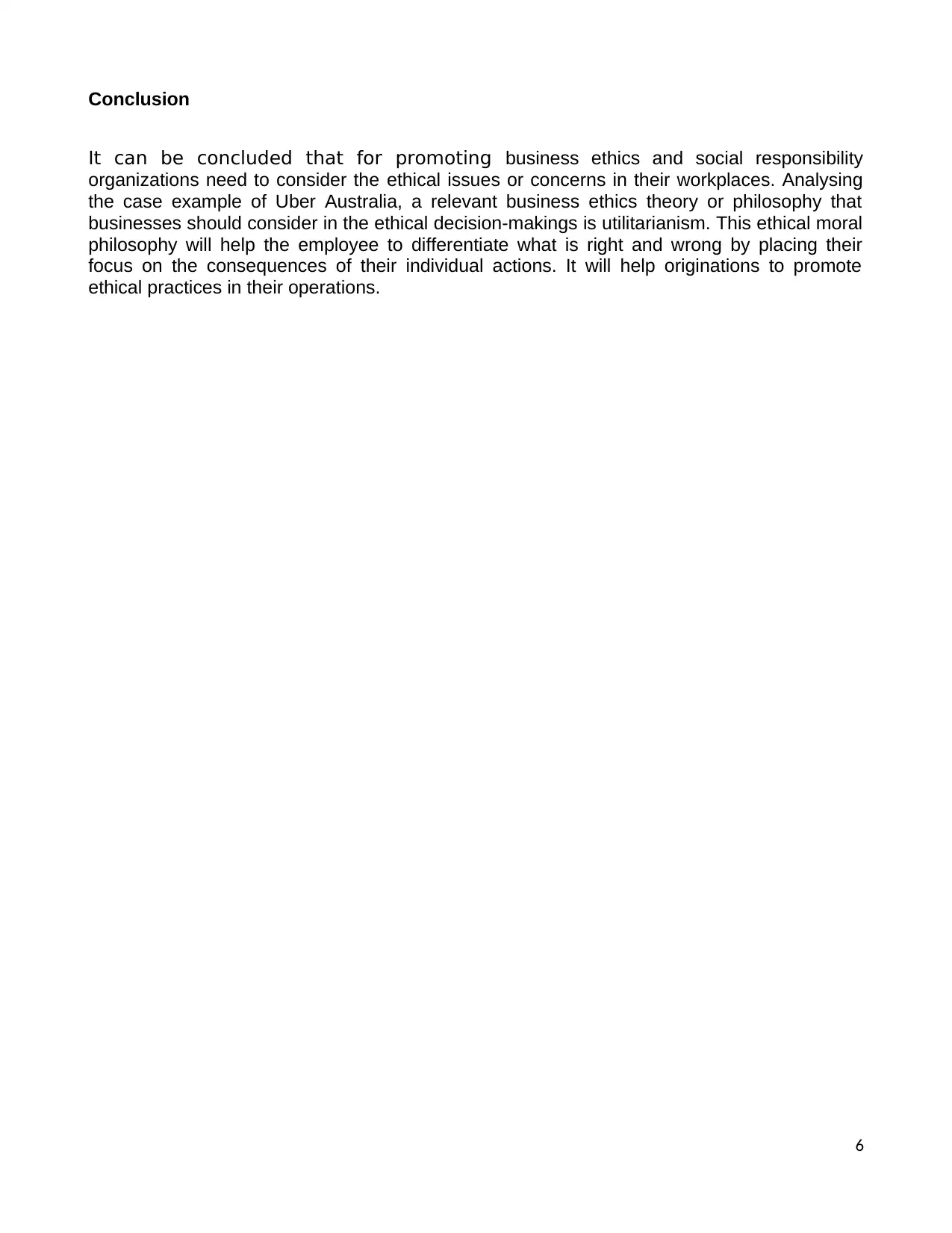
Conclusion
It can be concluded that for promoting business ethics and social responsibility
organizations need to consider the ethical issues or concerns in their workplaces. Analysing
the case example of Uber Australia, a relevant business ethics theory or philosophy that
businesses should consider in the ethical decision-makings is utilitarianism. This ethical moral
philosophy will help the employee to differentiate what is right and wrong by placing their
focus on the consequences of their individual actions. It will help originations to promote
ethical practices in their operations.
6
It can be concluded that for promoting business ethics and social responsibility
organizations need to consider the ethical issues or concerns in their workplaces. Analysing
the case example of Uber Australia, a relevant business ethics theory or philosophy that
businesses should consider in the ethical decision-makings is utilitarianism. This ethical moral
philosophy will help the employee to differentiate what is right and wrong by placing their
focus on the consequences of their individual actions. It will help originations to promote
ethical practices in their operations.
6
⊘ This is a preview!⊘
Do you want full access?
Subscribe today to unlock all pages.

Trusted by 1+ million students worldwide
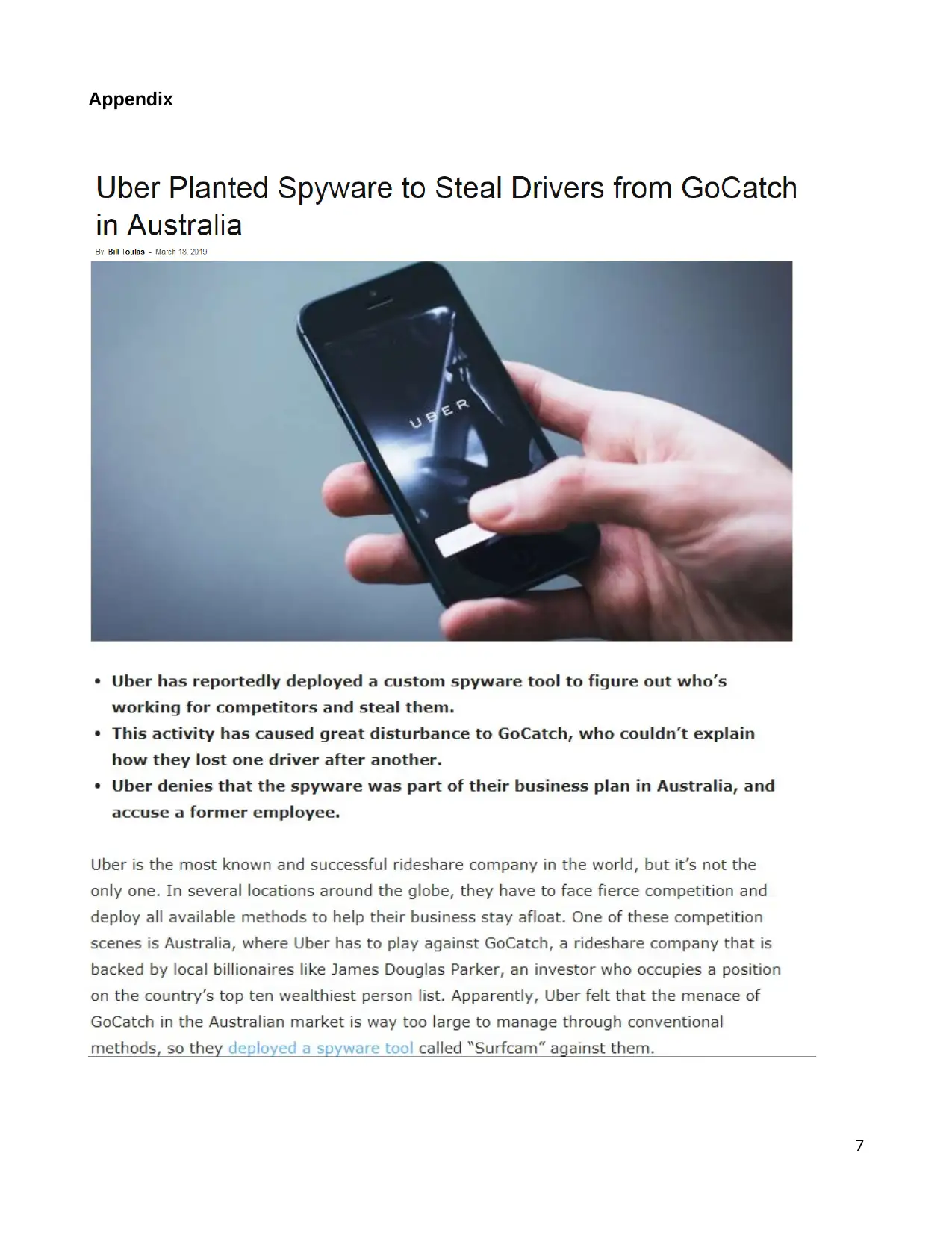
Appendix
7
7
Paraphrase This Document
Need a fresh take? Get an instant paraphrase of this document with our AI Paraphraser
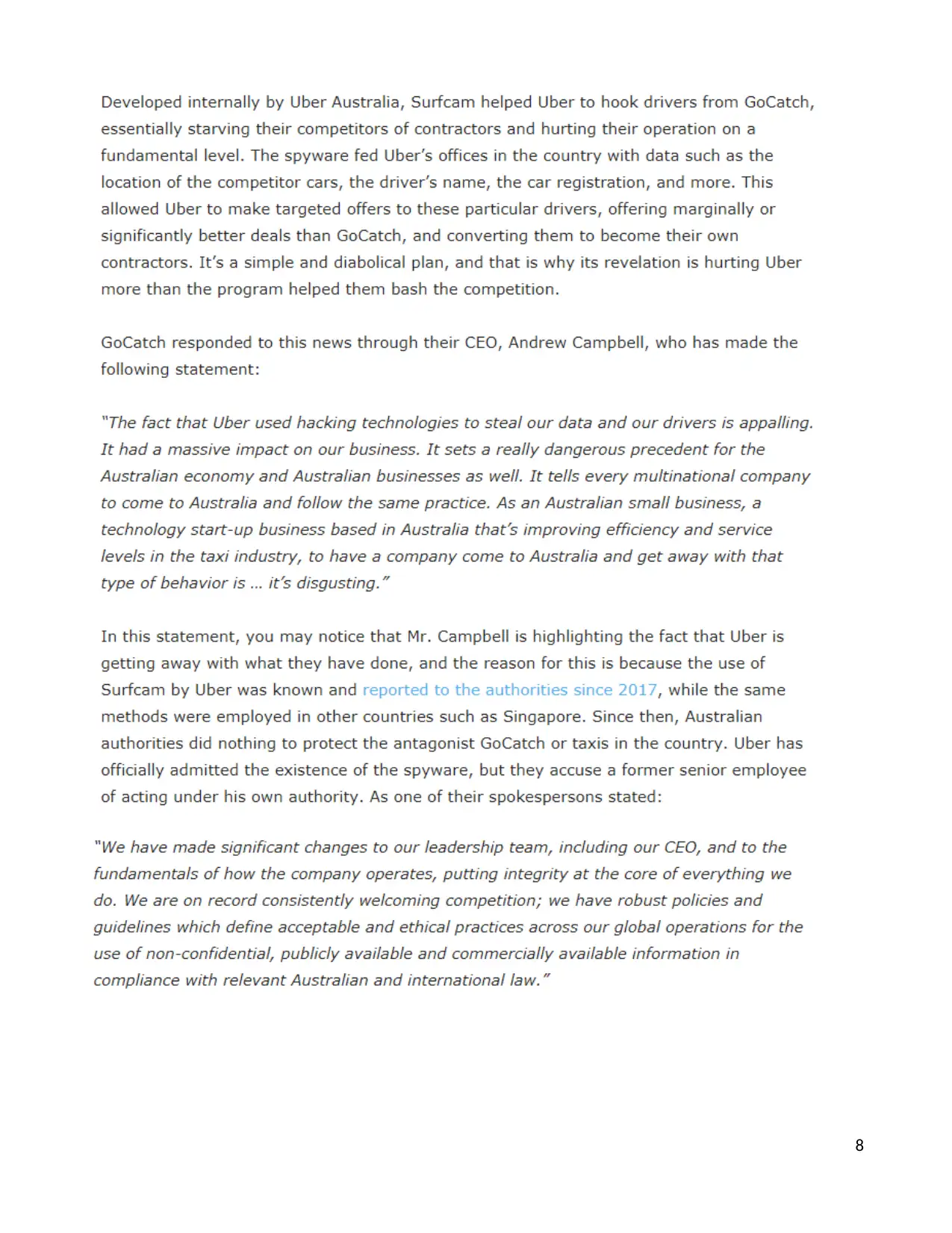
8
1 out of 8
Related Documents
Your All-in-One AI-Powered Toolkit for Academic Success.
+13062052269
info@desklib.com
Available 24*7 on WhatsApp / Email
![[object Object]](/_next/static/media/star-bottom.7253800d.svg)
Unlock your academic potential
Copyright © 2020–2026 A2Z Services. All Rights Reserved. Developed and managed by ZUCOL.





